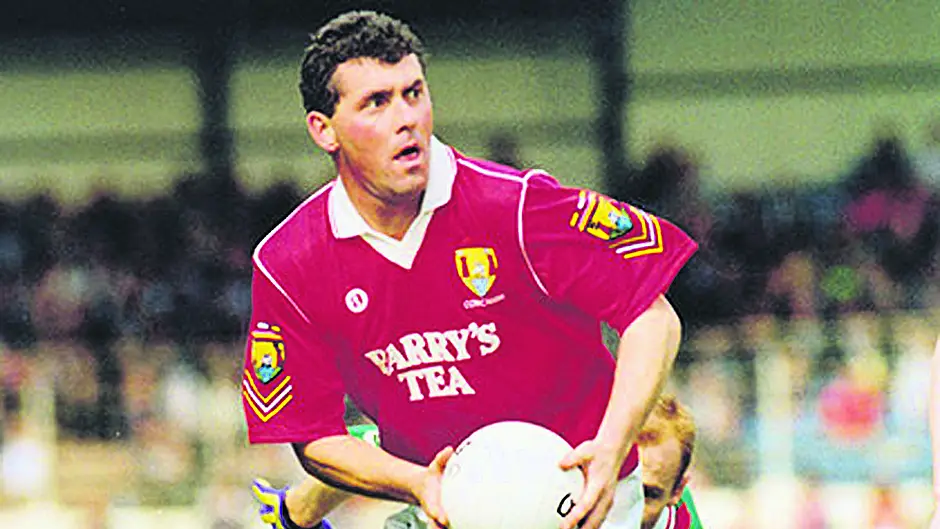O’DONOVAN Rossa has produced some powerhouse footballers over the years. All-Star John Evans was a defensive rock. Goalkeeper Kevin O’Dywer oozed All-Star quality, too. The exploits of Tony Davis are legendary. For club and county, they delivered. And then there is Mick McCarthy, the greatest player ever to wear the Rossa’s red.
Twenty-three years ago this month, Small Mick, as he was so well known (there was another boy in his class in school called Mick so one was christened Big Mick and the other, Small Mick), tragically died in a car accident, his life cut short at 33 years of age, but his legend lives on, as do the tales of his extraordinary exploits that elevated him to hero status.
He remains a generational talent. The young Skibb boy who played four years at U12. The great entertainer who kicked four goals in the second half of the 1992 Kelleher Shield final against Bishopstown. The local legend who captained O’Donovan Rossa to the 1993 All-Ireland club senior football title (still the only time a West Cork club has reached such lofty heights). The football genius who tormented and bamboozled defenders and turned them inside out, twisting their blood. The larger-than-life character who remains the darling son of Skibb.
(In December 2019 former Minister Jim Daly proposed that a life-size sculpture of Small Mick should be commissioned and erected in Skibbereen, but it seems that idea hasn’t progressed since.)
Small by name, he was a giant on and off the field. Here was a footballer designed for centre stage and the big occasion. The bigger the game, the better he was.
‘How you react when the need is greatest is a true test of character,’ says Gene O’Driscoll, who played alongside McCarthy on that great O’Donovan Rossa team in the early 1990s, as well as coaching him on that same team.
‘Mick always delivered – and that’s a great sign of who he was. The more responsibility he had, the better he was. We depended on him and he never let us down. He was our go-to guy.’
Skibb’s gameplan was straightforward: get the ball to Mick as quickly and as often as possible. Even the opposition knew the plan, but he was hard to stop. Gaelic football was different in that era, it was the time before massed defences, and one-on-one there were fewer better than the gifted O’Donovan Rossa forward.
‘He was light, had a low centre of gravity, was two-footed, had a lot of pace over a short distance and he had the knack of showing defenders the ball and then bringing it back the other side and he was gone. John Cleary from Castlehaven would have been very similar to him,’ Gene O’Driscoll explains.
Tony Davis told the Star before: ‘Mick had a very unusual sidestep to get away from his man, I can see it in my mind’s eye. If he got ball within two steps of making the run, God nor man couldn’t get it off him, it was a score or a foul.’
O’Donovan Rossa would not have won the 1993 All-Ireland senior club title without their captain fantastic. He was the jewel in the crown. He had the X-factor.
That team had a bit of everything. The mix was good. Experience and youth. Steel and gold dust. Corner back John Evans was 37 years old, Gene O’Driscoll was 29, Skibb’s favourite Cavan man John Brady was 28, Tony Davis and Ian Breen were 27. Then there was Don Davis (23), Kevin O’Dwyer (19) and Neville Murphy (18). And there was 27-year-old Small Mick in his prime.
By then he had won All-Ireland senior titles with Cork (1989 and 90), had won All-Ireland U21 titles and had represented the Rebels at every grade. There were highlights at senior level – his super sub appearance in the 1989 All-Ireland final against Mayo when he came off the bench, kicked two points and won the game for Cork, while he was lively in the early stages of the 1990 final against Meath before going off injured.
The hometown hero never reached the heights with Cork that he did with Skibb where he was the go-to man, especially in that magical 1992/93 season.
Thirty-three to one outsiders before a ball was kicked in that season’s Cork SFC, Mick spearheaded Skibb’s drive to glory. They beat Nemo Rangers in the county final, he scored the crucial goal as Rossas defeated Kerry heavyweights, Dr Crokes, in the Munster semi-final in Skibb, and he top-scored with 0-6 in the provincial final win against St Senan’s of Clare.
Then came Small Mick’s heroics in the battle at Ballinascreen when he hit 1-9 as Skibb beat Lavey in an All-Ireland semi-final remembered more for the Derry side’s physical approach. Skibb kept their cool and advanced to the All-Ireland final against Éire Óg – and this was Small Mick’s greatest performance of all.
‘That was probably his best game,’ Gene O’Driscoll says, a nod to Skibb’s epic drawn final in Croke Park on that St Patrick’s Day.
He was outstanding and rescued the Rossas. He kicked 1-8 of their 1-12 total and earned them a draw when the game seemed to have slipped beyond them. Without him that day Skibb would have lost.
A few weeks later, Small Mick captained his home club to glory in the replay at the Gaelic Grounds. Another huge game, another four-point haul; like Gene O’Driscoll noted, Small Mick always delivered.
That Skibb team captured county, Munster and All-Ireland titles in a glorious spell, led by their match winner in attack.
‘We would have won nothing without Mick. He carried us,’ noted Joe O’Driscoll, man-of-the-match in the 1992 county decider against Nemo.
And then there’s this story that captures Small Mick’s brilliance and individuality. In October ’93 Skibb played the 1992 Kelleher Shield final against Bishopstown in Clonakilty. They were down seven points in the second half, he hadn’t had a kick in the game and even missed a penalty in the first half.
The crowd at Clon that day, including a good few of his friends, decided to have some fun.
‘Mick, when are you going to start playing?’
‘Hi Mick, the game started 40 minutes ago!’
‘Mick, will we get you a chair so you can rest?’
Then Small Mick switched on. In the next 15 minutes he hammered home four goals. He finished with 4-4 of Skibb’s 4-5 total, as they won 4-5 to 2-8. Another game he won, single-handedly.
After scoring his fourth goal, a penalty, legend has it he turned to the crowd, flashed a smile and quipped: ‘Lads, can I have that chair that ye promised me now!’
There was a huge cheer. He had done it again.
‘We had guys who could play ball and guys who could stop the opposition playing ball and then we had Mick – he was the catalyst for so much in that team,’ Gene O’Driscoll says.
‘He instilled a belief in our team that anything is possible. The opposition could hold him for 50 minutes but he’d win the game in the other ten minutes.’
Small Mick’s death in February 1998 left a town heartbroken, but the memories he created – on and off the field – will endure and ensure his contribution will never be forgotten










